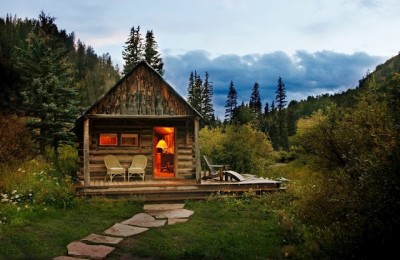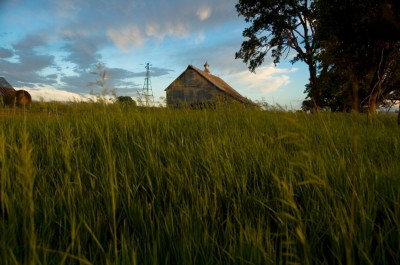
Image source: OffGridWorld
Real estate agents specializing in land sales are common, but agents with off-grid and survival-focused skills are not. If contracting with a professional off-the-grid living or self-reliance expert is not in the cards, do your homework and research before even thinking about signing on the dotted line at the end of a purchase contract.
A little knowledge will go a long way as you enter the homesteading search process. Do not be tempted by scenic soil because, as the saying goes, beauty is only skin deep. Looking down at your feet frequently will serve you a lot better when touring land. While picturesque sunsets are wonderful, if the land is unable to grow crops and is prone to flooding, your family will go hungry during a disaster.
Here are 7 tips if you’re looking for off-grid housing:
1. Make a list of the land attributes you will need to successfully live off the grid, raise livestock, grow crops, and maintain a secure perimeter before meeting with a real estate agent or browsing property online.
The list of wants and needs should include input from everyone in the family or mutual assistance groups [1]. Talk to a farmer or a rancher if you are new to homesteading. The educational tips garnered could help prevent making a very expensive and potentially fiscally crippling mistake.
New Relocation Manual Helps Average Americans Get Out Of Harms Way Before The Coming Crisis [2]
2. Online property browsing also gives you the chance to thoroughly research and compare similar properties in your price range. Print off the listing sheets and property record cards from the county auditor website, and then contact the local courthouse for a low-cost plat map and deed copies. Do not assume that mineral rights are included unless specifically stated. Some of the most popular and expansive online real estate websites are Survival Realty, Trulia, and Land Watch. Trulia allows searches for specific types of real property, such as farms and ranches. Land Watch does allow listings for any type of home, but is most known for its rural properties on large acre tracts. Survival Realty is owned and operated by off-the-grid living experts and specific land attributes must be present before an agent or home owner can list a property on the website. The search features on both websites,  as well as top-rated online real estate land venues, are simple to navigate and narrow down the listings to your area and specifications. Searching for real estate has never been easier. Browse thousands of homes, farms, ranches, and vacant large acreage tracts from the comfort of your own home. It costs you nothing and in the end, may save you from making a huge mistake when overcome by the beauty of a picturesque piece of land that will not suit all of your self-reliance needs.
as well as top-rated online real estate land venues, are simple to navigate and narrow down the listings to your area and specifications. Searching for real estate has never been easier. Browse thousands of homes, farms, ranches, and vacant large acreage tracts from the comfort of your own home. It costs you nothing and in the end, may save you from making a huge mistake when overcome by the beauty of a picturesque piece of land that will not suit all of your self-reliance needs.
3. Off the grid, homesteading, or prepper retreat properties should encompass five acres at the very least. The home and immediate area around the dwelling, barn and storage buildings will take up about one acre of the land. In order to grow enough crops and raise enough livestock to be a sustainable homestead, a minimum of four acres must remain. Ideally, at least 10 to 20 acres is recommended for a self-sufficient farm or ranch.
4. The property, unless it possesses massive acres (100 or more), should not border any major roads or highways for security and safety reasons. If the real estate agent warns you that the property is a few miles past the last paved road and has a “hidden driveway,” you are on the right track.
5. Land suitable for an off-the-grid existence should also have an independent water source. A creek, spring, lake, pond or river on or running adjacent to the land is ideal. If no such water source exists and the property fits all the other requirements for sustainability, hire an expert to discover whether or not the property is suitable for a well. Talk to neighbors; they are always a wealth of information. If they have a well [3] that has functioned properly for decades, drilling for one on your potential new property will also likely be successful.
6. A heating system which would still function if the power grid failed, or to use immediately if going off-grid, is also a top requirement for all properties toured. Heating with wood, a propane tank, or a gas furnace are common in rural areas. Talk to someone who has heated with wood to estimate how much wood you will need annually. Mature trees on the property will defray the cost of having wood delivered and provide an emergency source of fuel when such deliveries may no longer exist. Solar heating [4] is also an option in many locations. The hilly nature of the property and southern exposure should be reviewed thoroughly if planning on heating primarily or solely with solar power. Water heating systems are becoming more commonplace and should also be researched as a possible heating or backup heating source for the retreat.
7. The disposal of waste on both a daily and emergency basis should also be placed at the top of the priority list. The property should either already possess a septic [5] system or have the capability of having one installed. Composting commodes are also an option for the removal of human waste. Allowing waste to leak into the ground or the water supply can cause illness to both livestock and the family or members of the mutual assistance group.
What tips would you add? Tell us in the comments section below.
Sign up for Off The Grid News’ weekly email and stay informed about the issues important to you [6]
